中医英语病例讨论
- 格式:ppt
- 大小:179.50 KB
- 文档页数:19
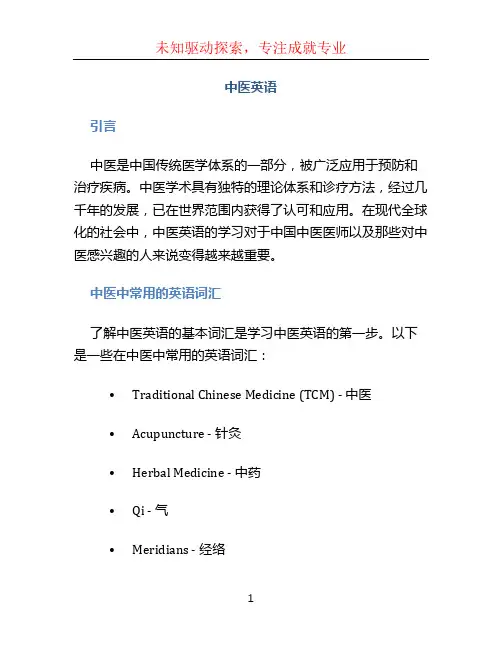
中医英语引言中医是中国传统医学体系的一部分,被广泛应用于预防和治疗疾病。
中医学术具有独特的理论体系和诊疗方法,经过几千年的发展,已在世界范围内获得了认可和应用。
在现代全球化的社会中,中医英语的学习对于中国中医医师以及那些对中医感兴趣的人来说变得越来越重要。
中医中常用的英语词汇了解中医英语的基本词汇是学习中医英语的第一步。
以下是一些在中医中常用的英语词汇:•Traditional Chinese Medicine (TCM) - 中医•Acupuncture - 针灸•Herbal Medicine - 中药•Qi - 气•Meridians - 经络•Yin and Yang - 阴阳•Five Elements - 五行•Diagnosis - 诊断•Treatment - 治疗•Moxibustion - 艾灸•Cupping - 拔罐•Tuina - 推拿这些词汇是中医英语学习的基础,掌握这些词汇将有助于更好地理解和学习中医理论与实践。
学习中医英语的方法学习中医英语的方法可以根据个人的学习习惯和需求来选择。
以下是一些常用的学习方法:1. 阅读中医相关的英文文献通过阅读中医相关的英文文献,可以了解到中医在国际上的研究和应用情况。
这不仅可以扩大中医的视野,还可以学习到更多的中医英语表达方式和专业术语。
2. 参加中医英语培训课程目前有一些机构提供中医英语培训课程,这些课程旨在帮助学习者更好地掌握中医英语,培养中医领域的英语表达能力。
通过参加这些课程,学习者可以学到专业的中医英语术语和表达方式,并且有机会与其他学习者一起进行交流和讨论。
3. 听力练习和口语训练通过听力练习和口语训练,可以提高中医英语的听说能力。
可以选择听一些中医英语的录音材料,如中医讲座或病例讨论,同时可以模仿并练习中医英语的口语表达。
4. 参与中医英语论坛和讨论参与中医英语论坛和讨论是锻炼中医英语写作能力的好方法。
可以加入一些中医英语的社群或在线论坛,与他人交流和分享中医知识,同时也可以提问和回答问题,提升自己的写作水平。
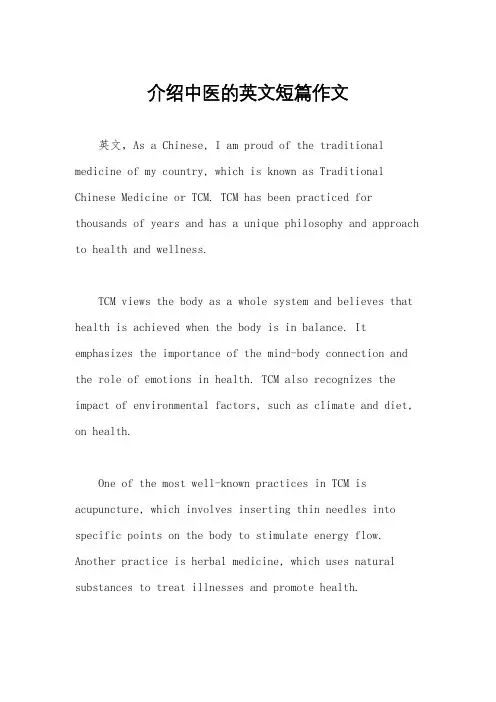
介绍中医的英文短篇作文英文,As a Chinese, I am proud of the traditional medicine of my country, which is known as Traditional Chinese Medicine or TCM. TCM has been practiced for thousands of years and has a unique philosophy and approach to health and wellness.TCM views the body as a whole system and believes that health is achieved when the body is in balance. It emphasizes the importance of the mind-body connection and the role of emotions in health. TCM also recognizes the impact of environmental factors, such as climate and diet, on health.One of the most well-known practices in TCM is acupuncture, which involves inserting thin needles into specific points on the body to stimulate energy flow. Another practice is herbal medicine, which uses natural substances to treat illnesses and promote health.TCM has been used to treat a wide range of conditions, from chronic pain and digestive issues to mental health disorders and infertility. It is also increasingly being integrated with Western medicine to provide a more comprehensive approach to healthcare.中文,作为一个中国人,我为我国的传统医学——中医感到自豪。
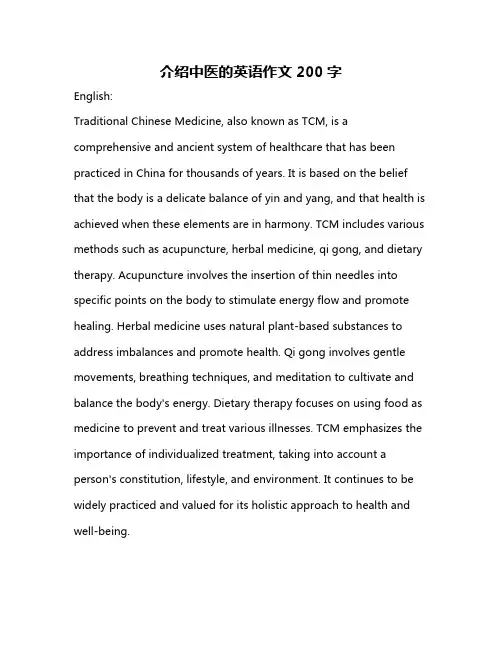
介绍中医的英语作文200字English:Traditional Chinese Medicine, also known as TCM, is a comprehensive and ancient system of healthcare that has been practiced in China for thousands of years. It is based on the belief that the body is a delicate balance of yin and yang, and that health is achieved when these elements are in harmony. TCM includes various methods such as acupuncture, herbal medicine, qi gong, and dietary therapy. Acupuncture involves the insertion of thin needles into specific points on the body to stimulate energy flow and promote healing. Herbal medicine uses natural plant-based substances to address imbalances and promote health. Qi gong involves gentle movements, breathing techniques, and meditation to cultivate and balance the body's energy. Dietary therapy focuses on using food as medicine to prevent and treat various illnesses. TCM emphasizes the importance of individualized treatment, taking into account a person's constitution, lifestyle, and environment. It continues to be widely practiced and valued for its holistic approach to health and well-being.Translated content:中医,又称中医药,是一种综合且古老的保健体系,在中国已经有数千年的历史。
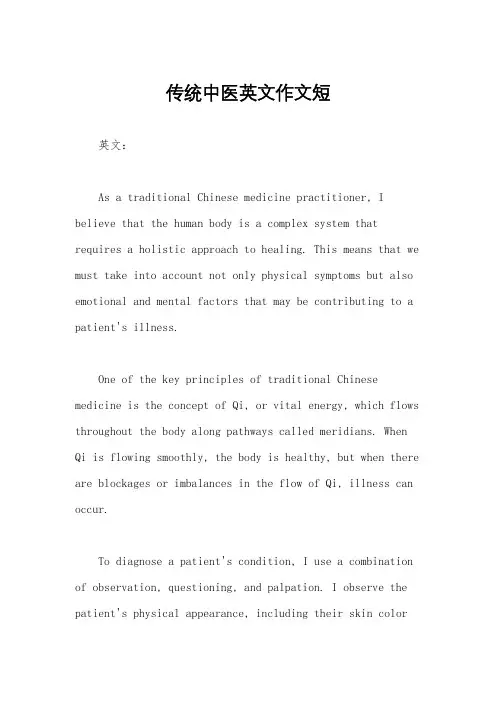
传统中医英文作文短英文:As a traditional Chinese medicine practitioner, I believe that the human body is a complex system that requires a holistic approach to healing. This means that we must take into account not only physical symptoms but also emotional and mental factors that may be contributing to a patient's illness.One of the key principles of traditional Chinese medicine is the concept of Qi, or vital energy, which flows throughout the body along pathways called meridians. When Qi is flowing smoothly, the body is healthy, but when there are blockages or imbalances in the flow of Qi, illness can occur.To diagnose a patient's condition, I use a combination of observation, questioning, and palpation. I observe the patient's physical appearance, including their skin colorand tone, the shape and size of their body, and the condition of their tongue and eyes. I also ask them about their symptoms, medical history, and lifestyle habits. Finally, I use palpation, or touching and feeling different parts of the body, to detect any areas of tenderness or tension.Once I have diagnosed a patient's condition, I develop a treatment plan that may include a combination of acupuncture, herbal medicine, dietary changes, andlifestyle modifications. For example, I might recommend acupuncture to help stimulate the flow of Qi, herbal medicine to address specific symptoms, dietary changes to support overall health, and lifestyle modifications such as exercise and stress reduction techniques.Overall, traditional Chinese medicine is a comprehensive and holistic approach to healing that focuses on treating the root cause of a patient's illness rather than just addressing their symptoms.中文:作为一名传统中医师,我认为人体是一个复杂的系统,需要综合治疗的方法。
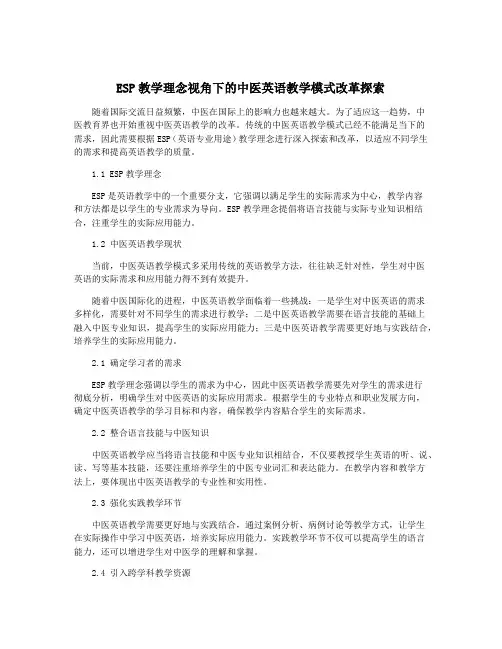
ESP教学理念视角下的中医英语教学模式改革探索随着国际交流日益频繁,中医在国际上的影响力也越来越大。
为了适应这一趋势,中医教育界也开始重视中医英语教学的改革。
传统的中医英语教学模式已经不能满足当下的需求,因此需要根据ESP(英语专业用途)教学理念进行深入探索和改革,以适应不同学生的需求和提高英语教学的质量。
1.1 ESP教学理念ESP是英语教学中的一个重要分支,它强调以满足学生的实际需求为中心,教学内容和方法都是以学生的专业需求为导向。
ESP教学理念提倡将语言技能与实际专业知识相结合,注重学生的实际应用能力。
1.2 中医英语教学现状当前,中医英语教学模式多采用传统的英语教学方法,往往缺乏针对性,学生对中医英语的实际需求和应用能力得不到有效提升。
随着中医国际化的进程,中医英语教学面临着一些挑战:一是学生对中医英语的需求多样化,需要针对不同学生的需求进行教学;二是中医英语教学需要在语言技能的基础上融入中医专业知识,提高学生的实际应用能力;三是中医英语教学需要更好地与实践结合,培养学生的实际应用能力。
2.1 确定学习者的需求ESP教学理念强调以学生的需求为中心,因此中医英语教学需要先对学生的需求进行彻底分析,明确学生对中医英语的实际应用需求。
根据学生的专业特点和职业发展方向,确定中医英语教学的学习目标和内容,确保教学内容贴合学生的实际需求。
2.2 整合语言技能与中医知识中医英语教学应当将语言技能和中医专业知识相结合,不仅要教授学生英语的听、说、读、写等基本技能,还要注重培养学生的中医专业词汇和表达能力。
在教学内容和教学方法上,要体现出中医英语教学的专业性和实用性。
2.3 强化实践教学环节中医英语教学需要更好地与实践结合,通过案例分析、病例讨论等教学方式,让学生在实际操作中学习中医英语,培养实际应用能力。
实践教学环节不仅可以提高学生的语言能力,还可以增进学生对中医学的理解和掌握。
2.4 引入跨学科教学资源为了提高中医英语教学的质量,可以引入跨学科的教学资源,比如请相关领域的专家学者进行讲解,或者组织学生参加国际学术会议、学术交流等活动,让学生接触更广泛的学术领域,提高学生的综合素质。
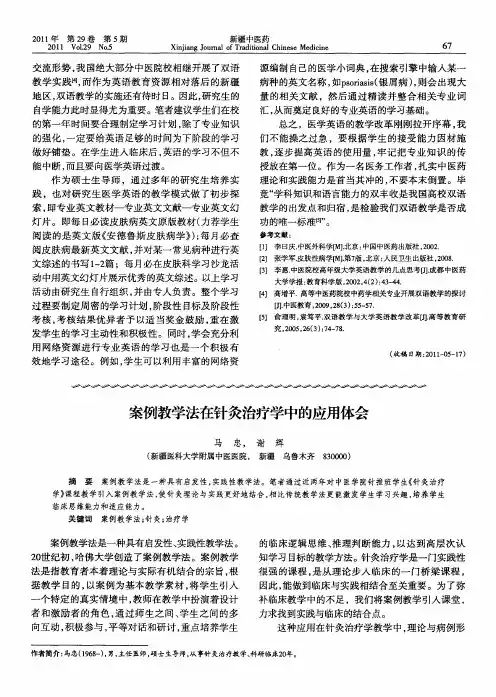
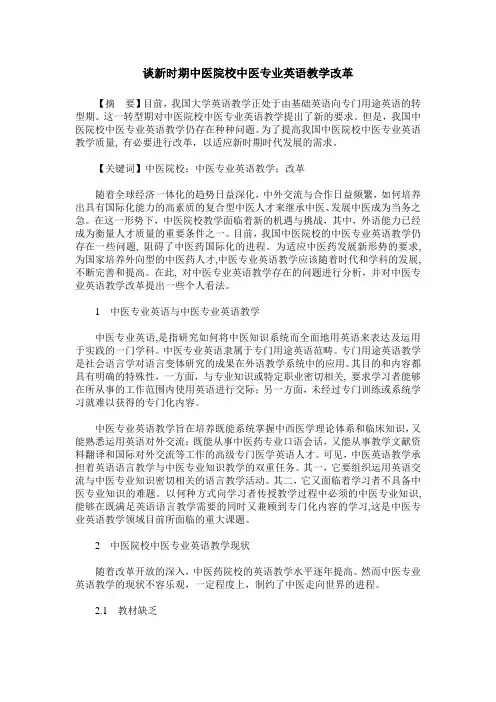
谈新时期中医院校中医专业英语教学改革【摘要】目前,我国大学英语教学正处于由基础英语向专门用途英语的转型期。
这一转型期对中医院校中医专业英语教学提出了新的要求。
但是,我国中医院校中医专业英语教学仍存在种种问题。
为了提高我国中医院校中医专业英语教学质量, 有必要进行改革,以适应新时期时代发展的需求。
【关键词】中医院校;中医专业英语教学;改革随着全球经济一体化的趋势日益深化,中外交流与合作日益频繁,如何培养出具有国际化能力的高素质的复合型中医人才来继承中医、发展中医成为当务之急。
在这一形势下,中医院校教学面临着新的机遇与挑战,其中,外语能力已经成为衡量人才质量的重要条件之一。
目前,我国中医院校的中医专业英语教学仍存在一些问题, 阻碍了中医药国际化的进程。
为适应中医药发展新形势的要求, 为国家培养外向型的中医药人才,中医专业英语教学应该随着时代和学科的发展, 不断完善和提高。
在此, 对中医专业英语教学存在的问题进行分析,并对中医专业英语教学改革提出一些个人看法。
1中医专业英语与中医专业英语教学中医专业英语,是指研究如何将中医知识系统而全面地用英语来表达及运用于实践的一门学科。
中医专业英语隶属于专门用途英语范畴。
专门用途英语教学是社会语言学对语言变体研究的成果在外语教学系统中的应用。
其目的和内容都具有明确的特殊性,一方面,与专业知识或特定职业密切相关, 要求学习者能够在所从事的工作范围内使用英语进行交际;另一方面,未经过专门训练或系统学习就难以获得的专门化内容。
中医专业英语教学旨在培养既能系统掌握中西医学理论体系和临床知识,又能熟悉运用英语对外交流;既能从事中医药专业口语会话,又能从事教学文献资料翻译和国际对外交流等工作的高级专门医学英语人才。
可见,中医英语教学承担着英语语言教学与中医专业知识教学的双重任务。
其一,它要组织运用英语交流与中医专业知识密切相关的语言教学活动。
其二,它又面临着学习者不具备中医专业知识的难题。
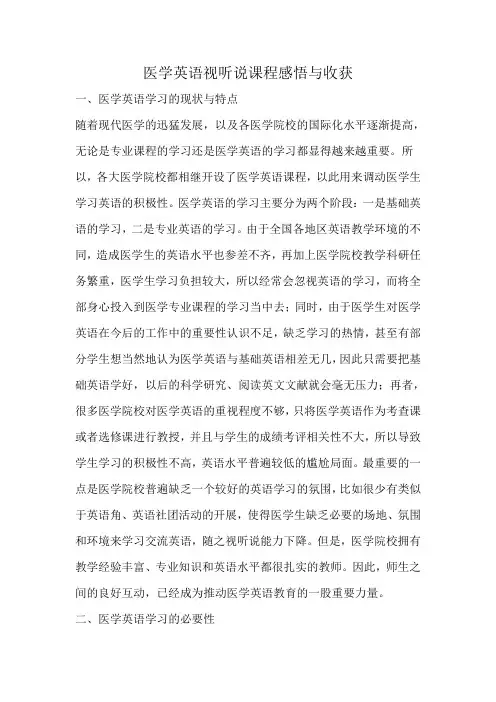
医学英语视听说课程感悟与收获一、医学英语学习的现状与特点随着现代医学的迅猛发展,以及各医学院校的国际化水平逐渐提高,无论是专业课程的学习还是医学英语的学习都显得越来越重要。
所以,各大医学院校都相继开设了医学英语课程,以此用来调动医学生学习英语的积极性。
医学英语的学习主要分为两个阶段:一是基础英语的学习,二是专业英语的学习。
由于全国各地区英语教学环境的不同,造成医学生的英语水平也参差不齐,再加上医学院校教学科研任务繁重,医学生学习负担较大,所以经常会忽视英语的学习,而将全部身心投入到医学专业课程的学习当中去;同时,由于医学生对医学英语在今后的工作中的重要性认识不足,缺乏学习的热情,甚至有部分学生想当然地认为医学英语与基础英语相差无几,因此只需要把基础英语学好,以后的科学研究、阅读英文文献就会毫无压力;再者,很多医学院校对医学英语的重视程度不够,只将医学英语作为考查课或者选修课进行教授,并且与学生的成绩考评相关性不大,所以导致学生学习的积极性不高,英语水平普遍较低的尴尬局面。
最重要的一点是医学院校普遍缺乏一个较好的英语学习的氛围,比如很少有类似于英语角、英语社团活动的开展,使得医学生缺乏必要的场地、氛围和环境来学习交流英语,随之视听说能力下降。
但是,医学院校拥有教学经验丰富、专业知识和英语水平都很扎实的教师。
因此,师生之间的良好互动,已经成为推动医学英语教育的一股重要力量。
二、医学英语学习的必要性如今,西医学已成为一门高速发展的学科,知识的更新日新月异,临床研究也愈加的专业化、国际化。
西方在这门学科的研究和应用领域大部分也都领先我国,很多优秀的医学著作如:克氏外科学、希氏内科学等对我国医学生具有很高的学习价值,并且很多杂志期刊、文献专著都是由英文撰写的。
因此,这个客观事实就决定了医学生学习医学的最佳语种是英语,只有学好英语才能适应日益频繁的国际交流。
随着我国的改革开放和更加国际化,医学生将会参加越来越多的以英文为主体的医学领域的会议、论坛等等。
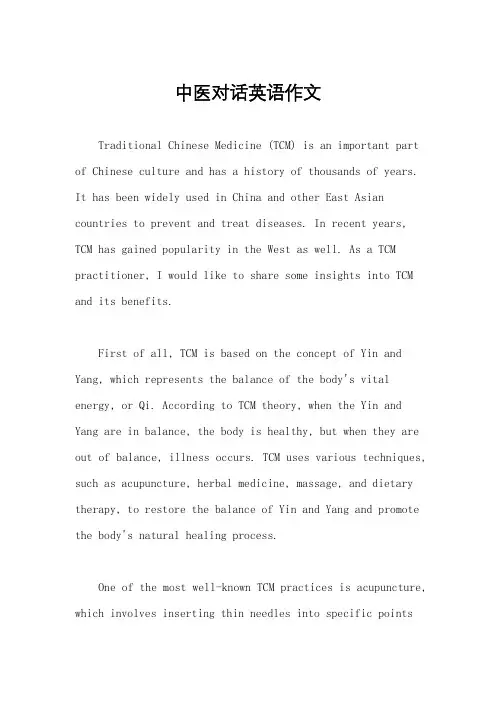
中医对话英语作文Traditional Chinese Medicine (TCM) is an important part of Chinese culture and has a history of thousands of years. It has been widely used in China and other East Asian countries to prevent and treat diseases. In recent years, TCM has gained popularity in the West as well. As a TCM practitioner, I would like to share some insights into TCM and its benefits.First of all, TCM is based on the concept of Yin and Yang, which represents the balance of the body's vital energy, or Qi. According to TCM theory, when the Yin and Yang are in balance, the body is healthy, but when they are out of balance, illness occurs. TCM uses various techniques, such as acupuncture, herbal medicine, massage, and dietary therapy, to restore the balance of Yin and Yang and promote the body's natural healing process.One of the most well-known TCM practices is acupuncture, which involves inserting thin needles into specific pointson the body to stimulate the flow of Qi and relieve pain. Acupuncture has been proven to be effective in treating a wide range of conditions, including chronic pain, migraines, and insomnia. Many people in the West have turned to acupuncture as an alternative to conventional medicine, and have experienced significant improvements in their health.In addition to acupuncture, TCM also uses herbal medicine to treat various health issues. TCM practitioners use a combination of herbs to create customized formulasthat address each patient's unique needs. These herbal formulas can be used to treat a wide range of conditions, from digestive disorders to respiratory problems. Unlike Western medicine, which often focuses on treating the symptoms of a disease, TCM aims to treat the root cause of the problem and restore the body's natural balance.Another important aspect of TCM is the emphasis on preventive care. In TCM, the focus is on maintaining good health and preventing illness before it occurs. TCM practitioners often recommend dietary and lifestyle changes to help patients stay healthy and avoid disease. Forexample, TCM diet therapy emphasizes the importance of eating a balanced diet that is tailored to eachindividual's constitution and health needs. By following TCM principles, people can improve their overall well-being and reduce their risk of developing chronic diseases.In conclusion, TCM offers a holistic approach to health and wellness that is rooted in ancient wisdom and has stood the test of time. By addressing the root cause of illness and promoting the body's natural healing abilities, TCM can provide effective and sustainable solutions to a wide range of health issues. As TCM continues to gain recognition and acceptance in the West, more people are turning to this traditional form of medicine to improve their health and well-being. Whether it's acupuncture, herbal medicine, or dietary therapy, TCM has a lot to offer in terms of promoting health and preventing disease.。
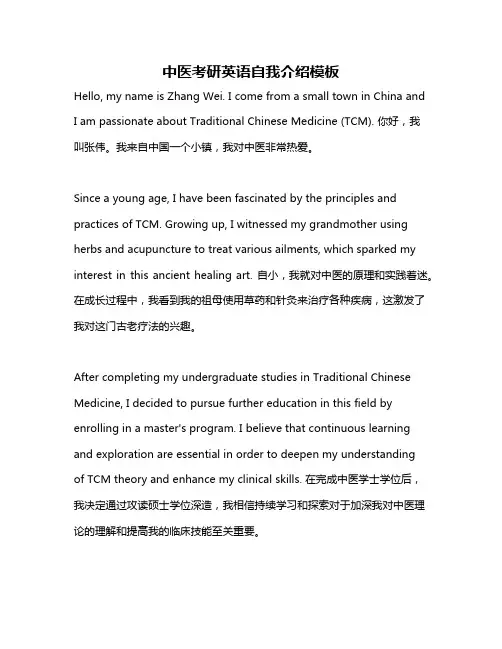
中医考研英语自我介绍模板Hello, my name is Zhang Wei. I come from a small town in China and I am passionate about Traditional Chinese Medicine (TCM). 你好,我叫张伟。
我来自中国一个小镇,我对中医非常热爱。
Since a young age, I have been fascinated by the principles and practices of TCM. Growing up, I witnessed my grandmother using herbs and acupuncture to treat various ailments, which sparked my interest in this ancient healing art. 自小,我就对中医的原理和实践着迷。
在成长过程中,我看到我的祖母使用草药和针灸来治疗各种疾病,这激发了我对这门古老疗法的兴趣。
After completing my undergraduate studies in Traditional Chinese Medicine, I decided to pursue further education in this field by enrolling in a master's program. I believe that continuous learning and exploration are essential in order to deepen my understandingof TCM theory and enhance my clinical skills. 在完成中医学士学位后,我决定通过攻读硕士学位深造,我相信持续学习和探索对于加深我对中医理论的理解和提高我的临床技能至关重要。
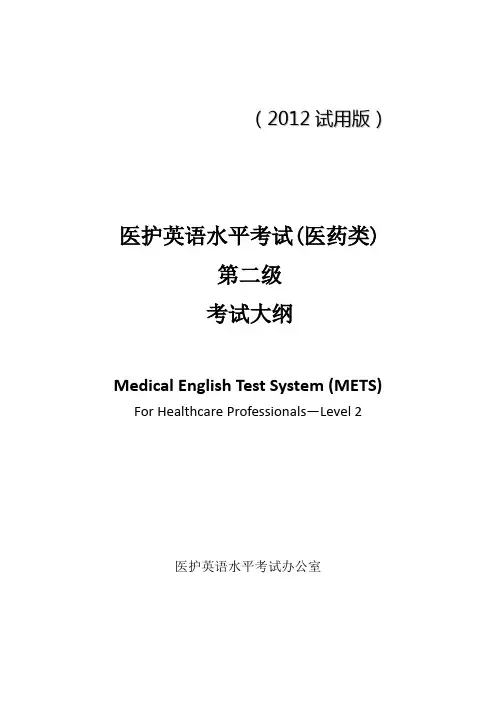
(2012试用版)医护英语水平考试(医药类)第二级考试大纲Medical English Test System (METS) For Healthcare Professionals—Level 2医护英语水平考试办公室目录一、METS(医药类)简介1.METS(医药类)考试体系的背景2.METS(医药类)考试的目标与宗旨3.METS(医药类)考试的设计原则4.METS(医药类)考试的成绩的使用及适用范围5.METS(医药类)考试的组织实施二、METS(医药类)第二级考试级别与内容概述1.METS(医药类)第二级考试的语言能力描述2.METS(医药类)第二级考试的话题范围描述三、METS(医药类)第二级考试结构与样卷1.METS(医药类)第二级考试结构2.METS(医药类)第二级考试样卷3.METS(医药类)第二级考试答题卡4.METS(医药类)第二级考试听力录音文本5.METS(医药类)第二级考试答案及评分标准附录METS(医药类)第二级考试词汇表一、METS(医药类)考试简介1、METS(医药类)考试体系的背景为适应经济全球化、教育国际化、医药卫生人才专业化的发展,满足国内外人才资源合理配置的需要,促进医药卫生类英语水平的提高,同时为进一步贯彻落实《国家中长期教育改革和发展规划纲要(2010年-2020年)》和《医药卫生中长期人才发展规划(2011-2020年)》的文件精神,健全符合卫生人才特点的科学化、社会化评价机制,“以用为本”,促进医药院校的行业英语教育教学改革,为医疗机构选拔人才提供评价服务,根据医护英语水平考试主办机构的统一规划,医护英语水平考试办公室(简称METS办公室)总结了METS(护理类)考试成功经验,力图在卫生行业除护理类以外,继续提供其他专业的医护英语考试评价标准。
经过几年的积累,METS考试办公室通过组织从事临床和科研工作的专家、语言测试专家和英语教学专家,根据医疗机构岗位的实际需求,开发设计了医护英语水平考试(医药类)考试大纲(试用版),其中涉及临床医学、中医、药学、助产、检验、康复等不同的专业类别,以下简称METS(医药类)。
英语四级作文模板中医Traditional Chinese Medicine。
Traditional Chinese Medicine (TCM) is a holistic system of healthcare that has been practiced in China for thousands of years. It is based on the belief that the body is a microcosm of the universe and that health is achieved when the body is in balance with its surroundings. TCM practitioners use a variety of techniques to diagnose and treat illness, including acupuncture, herbal medicine, massage, and dietary therapy.Acupuncture。
Acupuncture is a technique in which thin needles are inserted into specific points on the body. These points are believed to be located on meridians, which are channels through which qi, or vital energy, flows. By stimulating these points, acupuncturists can help to restore the flow of qi and promote healing. Acupuncture has been shown to beeffective in treating a variety of conditions, including pain, nausea, and headaches.Herbal Medicine。
如何学好中医英语作文高中首先,了解基本知识。
学好中医英语,首先要有扎实的中医基础知识。
要了解中医的概念、基本理论、诊断、治疗方法等方面的知识。
只有掌握了这些基本知识,我们才能更好地理解和应用中医英语。
其次,扩充词汇量。
学好中医英语,必须要掌握大量的专业术语和英语词汇。
通过阅读中医英语书籍、听英语讲座、参加中医英语培训等途径,积极扩充自己的词汇量。
并且要注重积累中医英语的常用词汇和短语,以便更好地进行交流和表达。
再者,多练习写作。
学好中医英语,并不仅仅是要求掌握知识和词汇,还需要有良好的英语写作能力。
我们可以通过写中文作文然后翻译成英语的方式来提高写作能力。
同时,也可以多写一些关于中医的英语文章,可以加强我们的表达能力和语言组织能力。
另外,多听和说。
学好中医英语,也需要进行听力和口语训练。
我们可以通过听力练习来提高听力水平,可以听一些中医英语讲座、访谈等内容。
同时,也可以多和同学、老师交流,提高自己的口语表达能力。
最后,不断积累经验。
学好中医英语,需要不断地积累经验,不断地提高自己的综合能力。
我们可以多参加中医英语的讨论、研讨会等活动,可以和中医专家、英语专家多交流,以便更好地掌握中医英语。
总之,学好中医英语是一个需要不断努力和积累的过程。
我们要加强基础知识的学习,扩充词汇量,多练习写作,多听和说,不断积累经验,才能更好地掌握中医英语,提高自己的综合能力。
希望每位同学都能在学习中医英语的过程中取得好成绩,为将来的发展奠定坚实基础。
武术和中医对话英文作文英文:As a practitioner of both martial arts and traditional Chinese medicine, I often find myself in dialogue between these two ancient practices. While they may seem unrelated on the surface, they are actually deeply connected in their approach to health and wellness.In martial arts, we focus on physical strength, agility, and balance. We train our bodies to move in precise and efficient ways, using our muscles and bones to strike, block, and defend. But we also learn to cultivate a strong mind and spirit, using meditation and mindfulness to stay focused and calm in the face of adversity.中文:作为武术和中医的实践者,我经常发现自己在这两种古老的实践之间进行对话。
虽然它们在表面上看起来不相关,但它们在健康和福利方面的方法却有着深刻的联系。
在武术中,我们专注于身体的力量、敏捷性和平衡。
我们训练我们的身体以精确和高效的方式移动,利用我们的肌肉和骨骼来打击、防御和保护。
但我们也学会了培养强大的心灵和精神,利用冥想和正念来在逆境中保持专注和冷静。
英文:Traditional Chinese medicine, on the other hand, takes a holistic approach to health and wellness. We view the body as a complex system of interconnected parts, and seek to bring balance and harmony to the body through acupuncture, herbal medicine, and other therapies. We also pay close attention to the mind and emotions, recognizing the important role they play in overall health.中文:另一方面,中医对健康和福利采取全面的方法。
中药鉴别实验英文作文英文:As a student of Traditional Chinese Medicine, I havehad the opportunity to learn about the identification of Chinese herbs. In order to identify a herb, we need to observe its characteristics such as its shape, color, texture, and smell. We also need to taste it to determineits flavor and properties.For example, when identifying Radix Astragali (Huang Qi), we observe its long, thin shape, yellowish-white color, and fibrous texture. It has a sweet taste and is slightly warm in nature. This herb is commonly used to tonify the spleen and lungs.Another example is the identification of Radix Salviae Miltiorrhizae (Dan Shen). This herb has a dark red color, a slightly bitter taste, and is slightly cold in nature. Itis commonly used to invigorate blood circulation and treatcardiovascular diseases.中文:作为一名中医学生,我有机会学习中药鉴别。
ESP教学理念视角下的中医英语教学模式改革探索在进行中医英语教学模式改革探索时,我们可以借鉴ESP(英语特定用途)教学的理念。
ESP教学强调根据学生的特殊需求和背景来设计教学内容和方法,以达到最佳教学效果。
在中医英语教学中,我们可以采取以下措施:要根据学生的专业需求来设计教学内容。
中医英语教学应该重点关注中医的基本理论、诊断方法、治疗方法等,帮助学生掌握相关的专业知识和术语。
还可以引入一些实际案例和病例分析,让学生通过真实的例子来学习和理解中医知识。
要采用多样化的教学方法。
传统的中医英语教学主要以讲授为主,学生 passively接受知识。
这种教学方法在一定程度上限制了学生的主动性和创造性,因此需要进行改变。
可以采用小组讨论、角色扮演、问题解决等活动,鼓励学生积极参与,培养他们的团队合作和解决问题的能力。
要加强实践性教学。
中医是一门实践性很强的学科,学生需要通过实践来掌握相关的技能。
在中医英语教学中,可以增加一些实际操作和临床实习的环节,让学生有机会将所学的理论知识应用到实际中去。
还可以邀请相关专业人士来进行讲座和实践指导,帮助学生更好地理解和掌握中医的实践技巧。
要与中医实践结合起来。
中医英语教学不仅要关注专业知识的掌握,还应该重视学生对中医文化的了解和认同。
在教学过程中,可以引导学生阅读相关的中医文化书籍和文章,了解中医的起源、发展和特点。
还可以组织学生参观中医诊所、学习中医调理养生方法,增强学生对中医的实际体验和认同感。
中医英语教学模式改革探索是一个系统而复杂的过程,需要教师和学生共同努力。
通过采用ESP教学的理念、多样化的教学方法、加强实践性教学和与中医实践结合,可以提高学生的学习兴趣和学习效果,培养他们的综合素质和创新能力,促进中医国际化进程的发展。
写中医的英文作文英文:As a practitioner of traditional Chinese medicine, I have always been fascinated by the unique approach thatthis ancient healing system takes towards health and wellbeing. Unlike Western medicine, which often focuses solely on the physical symptoms of a disease or condition, Chinese medicine takes a more holistic approach, considering the individual as a whole – body, mind, and spirit.One of the key principles of Chinese medicine is the concept of Qi, or life force energy, which flows through the body along channels known as meridians. When this energy becomes blocked or stagnant, it can lead to illness or disease. By using a variety of techniques, such as acupuncture, herbal medicine, and massage, Chinese medicine practitioners aim to restore the flow of Qi and promote healing.Another important aspect of Chinese medicine is the idea of balance. In Chinese philosophy, the universe is seen as a delicate balance between opposing forces, such as yin and yang, and the same is true for the human body. When these forces are out of balance, health problems can arise. Chinese medicine seeks to restore this balance through a variety of methods, such as dietary changes, exercise, and meditation.Overall, I believe that Chinese medicine offers a unique and valuable perspective on health and wellbeing. By considering the individual as a whole and addressing the underlying causes of illness, rather than just treating symptoms, Chinese medicine can help to promote long-term health and vitality.中文:作为一名中医师,我一直被这种古老的治疗系统所吸引,它对健康和福祉的独特方法。